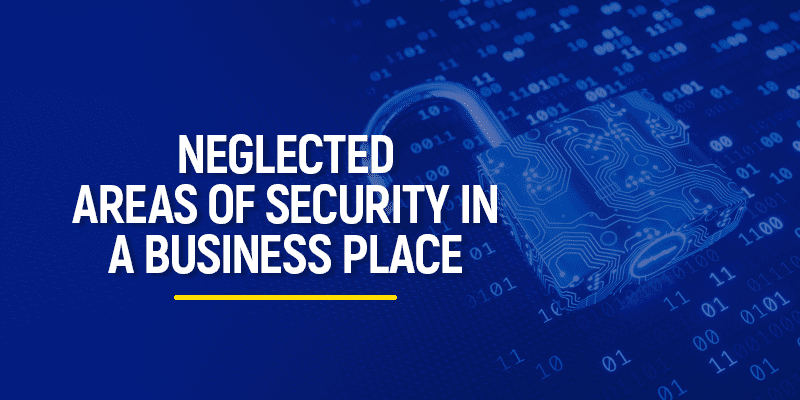
Thinking of starting up your business? Or planning on growing the empire? Either way, it takes much more than just a strong password or a large start-up fee to protect the future of your business. You might even overlook some of the most basic but important security measures.
Running a business, regardless of what degree, most of us tend to neglect certain aspects. Trust me, even if you’re thinking to yourself, “My business is small”, “I only run a tiny website for stickers”, or “I hired the best staff that money can buy, it doesn’t worry me”, there’ll always be one tiny detail that you failed to look into. Something as small as updating your device could lead to a business crashing down.
It’s happened before and could happen again, regardless of who you are or what business you run.
So, moving forward, I’ll be highlighting the tiny aspects that most businesses fail to detect or look into. Some of these points will show you the importance of cybersecurity and how to tackle these little flaws. And for sure, security information and event management systems will play a fundamental role depending on the type of business you run.
Why is security, in general, essential for a business?
The importance of security in business is a broad topic, but to highlight one of the main reasons why your business could fall short of success in the coming years, let’s talk about the rate of cyber attacks on businesses.
According to Finances Online, by 2021, the world will be hit with $6 trillion worth of damages, resulting in additional worldwide costs of $300 billion worth of cybersecurity services to filter out the previous damages done.
So, what can you do to slow down the rate of cyber-attacks? Yes, you!
Most business owners seem to overlook the possibility that they, too, can help prevent future cyberattacks, and on the other hand, smaller businesses seem to think that they don’t fall into this equation.
But did you know that 43% of cyber-attacks are targeted towards smaller businesses?
To avoid all this and to dodge a quick bullet that’ll land you in great loss, pushing security measures into your daily lives, will help businesses thrive in the long run.
Security in business – What it does for you?
Here’s a little why security is important for big businesses, small companies, or home-based businesses:
- Protects sensitive information or data.
- Improves the productivity of a company/business
- It reduces the chances of having to compensate for the loss of insurance.
- Protects multiple devices from being hacked into or infiltrated.
- A steady and thriving business means no scandal, and no scandal means more happy customers.
Security measures for businesses that are often overlooked
It’s common for someone to forget one or two things when it comes to creating a secure workspace or environment. It depends on a lot of factors. Security doesn’t only mean protecting data and devices, but efforts are put towards developing basic and human rights to safety when working for a company.
However, in this article, I’ll be highlighting a few security tips that most business owners fail to look into, which could help keep businesses up and running in the future. There might be a few factors that you’ve already invested in and some that you mightn’t be aware of.
But it’s okay to go through the basics again, just to double-check and single out what more can be done. Let’s begin with:
Train your team!
The protection of the device and data depends on how much you trust the team you hire. Sometimes, it’s not only the employees that need training but rather the employer. Yes! It’s about security training as a whole. You can’t possibly expect your team to be reliable when the boss didn’t pay heed to train them in the first place. But let’s not get into that right now. What you should be getting into are quarterly or yearly workshops.
Get your team involved with the basics of business security; covering topics a little at a time. However, just a yearly lecture isn’t going to cut it, you’ll have to come up with interesting ways to do it. Like:
- Use flashcards
- Multi-media presentations
- Teach end-users how to handle the facility and the equipment.
- Computer training courses
- Educate them on updated security measures
- Make groups among your staff, depending on their posts. (Employees have different posts but everyone needs the basics).
This might seem like a lot, and you’re probably going to think about the financial aspects of this or about why you should be training them in the first place, “because you’re paying them to know their jobs, right?” Not everyone you hire will be honest with you regarding their capabilities.
But something as simple as one workshop a year won’t put a dent in your pockets. This will save you future financial losses; ensuring that your staff understands how to handle their jobs and what could go wrong when not exposed with a little knowledge.
Know who you’re hiring.
A huge part of effective security in business also depends on the staff you hire for the job. Like I said, the security of a business does not revolve entirely on data and devices but also the trust level that you have to maintain with your employees.
The thing is when you’re hiring someone to take on a certain task, like maybe access to all the sensitive files of data of the company, you can’t just simply look at their qualifications. Sure, a great degree is worth looking at, but what about the character?
This is where educating your staff and hiring the right people for the job come hand-in-hand. It’s like you require a personal assistant. You hire them in terms of the previous job they had, or maybe based on their education. You trust them with every business contact, personal file, password, etc, only to find out all your sensitive data has either been wiped clean or sold over the internet.
Always remember that even a shiny and new object comes with flaws. So, before hiring someone, here’s what you should look into:
- Qualifications
- Past experiences
- Skills
- Personal security measures (how they protect their devices)
- Background check on attitude/behaviour. (why they left the previous job, personality assessments, criminal or sexual abuse records, anything that’ll give you a clearer picture)
- Continuous check-ins on employee behaviour way after hiring them. (This ensures that they continue to keep up good work ethics and efficient working regimes)
It won’t make you less of a leader if you get up close and professionally personal with your employees. To keep a business thriving, doing a thorough background sweep of the staff is a bit hit and miss when it comes to the security of the company, but it certainly adds to the betterment in the long run.
Physical surveillance
Sometimes, cyber attacks or security breaches take place in the flesh, within the walls of your company. There are circumstances where unknown people can literally just walk into your office doors dressed as a cleaner or an internet, etc. Believe me, it doesn’t only happen in the movies. Sometimes lack of surveillance in all the right areas of the company opens doors to attacks. Protecting your devices is as important as protecting your data.
For example, due to a lack of physical security, a 14-year old teenager in Poland hacked the Lodz tram network. He simply just walked through tram depots to get a little Intel on the track systems and infrastructure. He used this information to turn an old TV remote into a modified remote to control and hack the systems of the tram tracks.
This was a little bit of an eye-opener, proving that if a kid can trespass into secured lines and hack into carefully engineered tram control units, then where does the security of small businesses lie in comparison?
Securing the perimeters of your quarters and enforcing proper surveillance in all areas of the building is a great step in the right direction.
Destroy all evidence
Spring cleaning is right around the corner, and so is the need for mega updates in your business. You dispose of all data stored on a hard drive, your old washed laptop/cell phone, or maybe even take down notes on a piece of paper. As the saying goes, “One man’s trash is another man’s treasure.” And the saying is absolutely true!
If you’re ever in the woods of disposing of your old hard drives, discs, paper files, flash drives, or other physical equipment, make sure you’ve wiped them out squeaky clean. Just because you physically get rid of them doesn’t mean that the data previously saved on it is not accessible.
You’ll be surprised as to who could possibly love those old discarded drives. If it gets into the wrong hands, you’re properly going to lose much more than you bargained for. Most official drives that are discarded aren’t usually purged of all the files they hold.
Someone could make a big buck from all the contacts, files, pictures, employee names, salaries, etc., that they find; from what you thought was a deleted and discarded hard drive.
Home business security
Just because you’re working from home doesn’t mean that you’re free from the next cyber attack. It’s a fact if you’re a work-from-home boss or employee; the environment you work in is automatically not safe. The security setting at home is not the same as it is at the office. You’re probably undermanned or just don’t have the proper security tools.
Secondly, if you’re a boss and just recently were asked by one of your employees if they could work from home, this too should send out a red flag. There are many cases where employees connect to random or free Wi-Fi hotspots while using office laptops or phones. This could result in a cyber attacker stealing your data by hacking into your device’s system.
Other factors to look into:-
The points above were only a fraction of security measures that most businesses seem to ignore. There are so many factors to consider when talking about keeping your business on top of the security game, but it takes one tiny slip among the hundreds of high-end security measures you inculcated. Here are a few more points to brush up on:
- Encrypt your files and your data.
- Use security software on your devices.
- Make sure you have two-factor authentication codes set up on your devices and business accounts.
- Update your apps, passwords, etc.
- Give regular checks into the data log files. That’s one of the most commonly accessed points by cybercriminals.
To conclude
To run a successful business, there’s so much more that you’ll need other than just hiring a staff to take on personal calls and write down notes, etc. Security is important, regardless of what line of work you’re in.
Even something a little more downscale, like a flower shop, can be victimized in the online world. The methods mentioned, of course, aren’t the only means to make security in business a priority, and neither am I saying that it’s all you’ll need to stop the data breaches, the device hacks or data infiltrations that businesses face, but it surely will help slow down the process, one security measure at a time.







